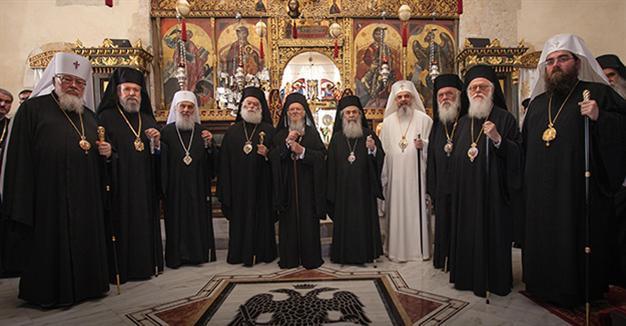Historic Orthodox meet marred by Russian no show
ATHENS

AP photo
Orthodox churches from around the world met in Greece on June 19 for the first such gathering in a millennium, but the absence of several branches of the communion threatened to mar the event.The religious leaders celebrated Orthodox Pentecost in the town of Heraklion on the island of Crete where a “divine liturgy” was given as part of the gathering that will last until June 27.
The historical meeting, which had been due to be held in Istanbul this year after centuries away, was shifted to Crete. The move came after the Russian Orthodox Church indicated that it did not want to come to Turkey due to the crisis between the two countries over the downing of a Russian jet that violated the Turkish-Syrian border last year, Fener Rum Patriarch Bartholomew told a group of journalists on April 18.
Bartholomew called the “Holy and Great Council” on issues including wedlock, fasting, and united representation in dioceses in countries such as the United States and Australia.
Greek President Prokopis Pavlopoulos took part in the mass that was aired live on state broadcaster ERT.
But the absence of Russian Orthodox leader Kyrill, who represents some 130 million faithful - half the world’s Orthodox population - threatened to undermine the image of unity that the gathered leaders had sought to project.
Aside from Russia, the Orthodox churches of Bulgaria and Georgia were also absent. Both are considered close to Moscow.
The Patriarchate of Antioch is also staying away because of a spat with Jerusalem over the appointment of clerics in Qatar.
“This great and holy council will carry the message of unity... it will help to escape the deadlocks of the present,” Bartholomew told local media.
The last such meeting was in 1054 when Christianity split between Catholicism and Orthodoxy, in the so-called “great schism” -- and working out the details of the new council has taken over 50 years.
“The unity of Orthodoxy is good for us all. It is those who are absent who will miss out,” said Greek Foreign Minister Nikos Kotzias.
The Orthodox communion has about 250 million followers worldwide and consists of 14 autonomous churches though it has been shaken by the upheavals in the former Soviet bloc and the Middle East in recent decades and is frequently plagued by national and political strife.
The first Pan-Orthodox Council is highly anticipated, as it has been planned ever since 1961.
The Patriarch explained that the last equivalent of such a Council, the “Ecumenical Council,” was held in Nicaea (İznik in today’s Turkey) in the year 787, centuries before the Eastern and Western Churches were split in the Schism of 1054.
















